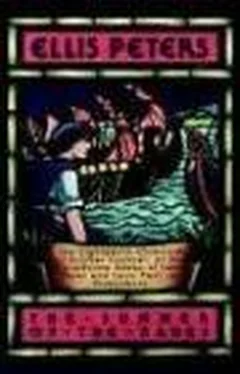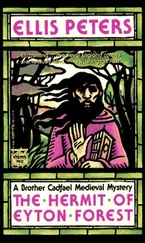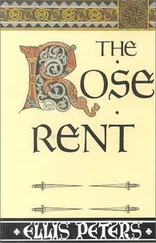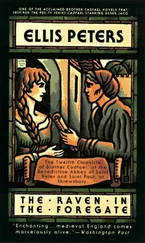Cadfael went down on his knees beside the body, and gently turned back the breast of the woollen gown to reveal the wound more clearly to the quivering light. Gwion, behind him in the doorway and hesitant to enter, drew deep breath, and let it out in a gusty sob that caused the flame to flicker wildly, and what seemed a living shudder passed over the dead face.
“Be easy,” said Cadfael tolerantly, and leaned to close the half-open eyes. “For he is easy enough now. Well I know, he was of your allegiance. And I am sorry!”
Mark stood quiet and still, staring down in undismayed compassion. “I wonder had he wife and children,” he said at last. Cadfael marked the first focus of one fledgling priest’s concern, and approved it. Christ’s first instinct might have been much the same. Not: “Unshriven, and in peril!” not even: “When did he last confess and find absolution?” but: “Who will care for his little ones?”
“Both!” said Gwion, very low. “Wife and children he has. I know. I will deal.”
“The prince will give you leave freely,” said Cadfael. He rose from his knees, a little stiffly. “We must go, all, and tell him what has befallen. We are within his writ and guests in his house, all, not least this man, and this is murder. Take the torch, Gwion, and go before, and I will close the door.”
Gwion obeyed this alien voice without question, though it had no authority over him but what he gave of his own free will. On the threshold he stumbled, for all he was holding the light. Mark took his arm until he had his balance again, and as courteously released him as soon as his step was secure. Gwion said no word, made no acknowledgement, as Mark needed none. He went before like a herald, torch in hand, straight to the steps of the great hall, and lit them steadily within.
“We were all in error, my lord,” said Cadfael, “in supposing that Bledri ap Rhys had fled your hospitality. He did not go far, nor did he need a horse for the journey, though it is the longest a man can undertake. He is lying dead in the lodging where your steward housed him. From all we see there, he never intended flight. I will not say he had slept. But he had certainly lain in his bed, and certainly put on his gown over his nakedness when he rose from it, to encounter whoever it may have been who walked in upon his rest. These two with me here have seen what I have seen, and will bear it out.”
“It is so,” said Brother Mark.
“It is so,” said Gwion.
Round Owain’s council table in his private apartment, austerely furnished, the silence lasted long, every man among his captains frozen into stillness, waiting for the prince’s reaction. Hywel, standing at his father’s shoulder, in the act of laying a parchment before him, had halted with the leaf half-unrolled in his hands, his eyes wide and intent upon Cadfael’s face.
Owain said consideringly, rather digesting than questioning the news thus suddenly laid before him: “Dead. Well!” And in a moment more: “And how did this man die?”
“By a dagger in the heart,” said Cadfael with certainty.
“From before? Face to face?”
“We have left him as we found him, my lord. Your own physician may see him just as we saw him. As I think,” said Cadfael, “he was struck a great blow that hurled him back against the wall, so that he fell stunned. Certainly whoever struck him down faced him, this was confrontation, no assault from behind. And no weapon, not then. Someone lashed out with a fist, in great anger. But then he was stabbed as he lay. His blood has run down and gathered in the folds of his gown under his left side. There was no movement. He was out of his senses when he was stabbed. By someone!”
“The same someone?” wondered Owain.
“Who can tell? It is probable. It is not certain. But I doubt he would have lain helpless more than a matter of moments.”
Owain spread his hands upon the table before him, pushing aside the parchments scattered there. “You are saying that Bledri ap Rhys has been murdered. Under my roof. In my charge, however he may have come there, friend or enemy, to all intent he was a guest in my house. This I will not abide.” He looked beyond Cadfael, at Gwion’s sombre face. “You need not fear that I will value my honest enemy’s life at less than any man of my own,” he said in generous reassurance.
“My lord,” said Gwion, very low, “that I never doubted.”
“If I must go after other matters now,” said Owain, “yet he shall have justice, if by any means I can ensure it. Who last saw the man, living?”
“I saw him leave the chapel, late,” said Cadfael, “and cross towards his own lodging. So did Brother Mark, who was with me. Beyond that I cannot say.”
“At that time,” said Gwion, his voice a little hoarse with constraint, “I was in the chapel. I talked with him. I was glad to see a face I knew. But when he left I did not follow.”
“Enquiry shall be made,” said Owain, “of all the servants of the house, who would be the last wakeful about the maenol. See to it, Hywel. If any had occasion to pass there, and saw either Bledri ap Rhys, or any man going or coming late about his door, bring the witness here. We muster at first light, but we have yet a few hours before dawn. If this thing can be resolved before I go to deal with my brother and his Danes, so much the better.”
Hywel departed on the word, laying his leaf of vellum down on the table, and plucking a couple of men out of the council to speed the search. There was to be no rest that night for the menservants, stewards and maids of Owain’s court, none for the members of his bodyguard, or the young men who followed him in arms. Bledri ap Rhys had come to Saint Asaph intending mischief, threatening mischief, and the cost had fallen on his own head, but the echoes would spread outward like ripples from a stone flung into a pool, and scarify the lives of all here until murder was paid for.
“The dagger that was used,” said Owain, returning to his quest like a hawk stooping. “It was not left in the wound?”
“It was not. Nor have I examined the wound so closely that I dare guess what manner of blade it had. Your own men, my lord, will be able to hazard that as well as I. Better,” said Cadfael, “since even daggers change with years, and I am long out of the practice of arms.”
“And the bed, you say, had been slept in. At least lain in. And the man had made no preparation for riding, and left no sign he ever intended flight. It was not so vital a matter that I should set a man to watch him through the night. But there is yet another mystery here,” said the prince. “For if he did not make away with one of our horses, who did? There is no question but the beast is gone.”
It was a point that Cadfael, in his preoccupation with Bledri’s death, had not even considered. Somewhere at the back of his mind he had felt the nagging and elusive misgiving that something else would have to be investigated before the night was over, but in the brief instants when he ventured to turn and attempt to see it clearly, it had vanished from the corner of his eye. Suddenly confronted with the puzzle that had eluded him, he foresaw a lengthy and careful numbering of every soul in the maenol to find the one, the only one, lost without trace. Someone else would have to undertake that, for there could be no delay in the prince’s dawn departure.
“It is in your hands, my lord,” he said, “as are we all.”
Owain flattened a large and shapely hand upon the table before him. “My course is set, and cannot be changed until Cadwaladr’s Dublin Danes are sent back to their own land with clipped ears, if it comes to that. And you, Brothers, have your own way to go, in less haste than my way, but not to be delayed, either. Your bishop is entitled to as strict service as princes expect. Let us by all means consider, in what time we have left, which among us may have done murder. Then, if it must be left behind for another time, yet it shall not be forgotten. Come, I’ll see for myself how this ill matter looks, and then we’ll have the dead cared for, and see due reparation made to his kin. He was no man of mine, but he did me no wrong, and such right as I may I’ll do to him.”
Читать дальше












